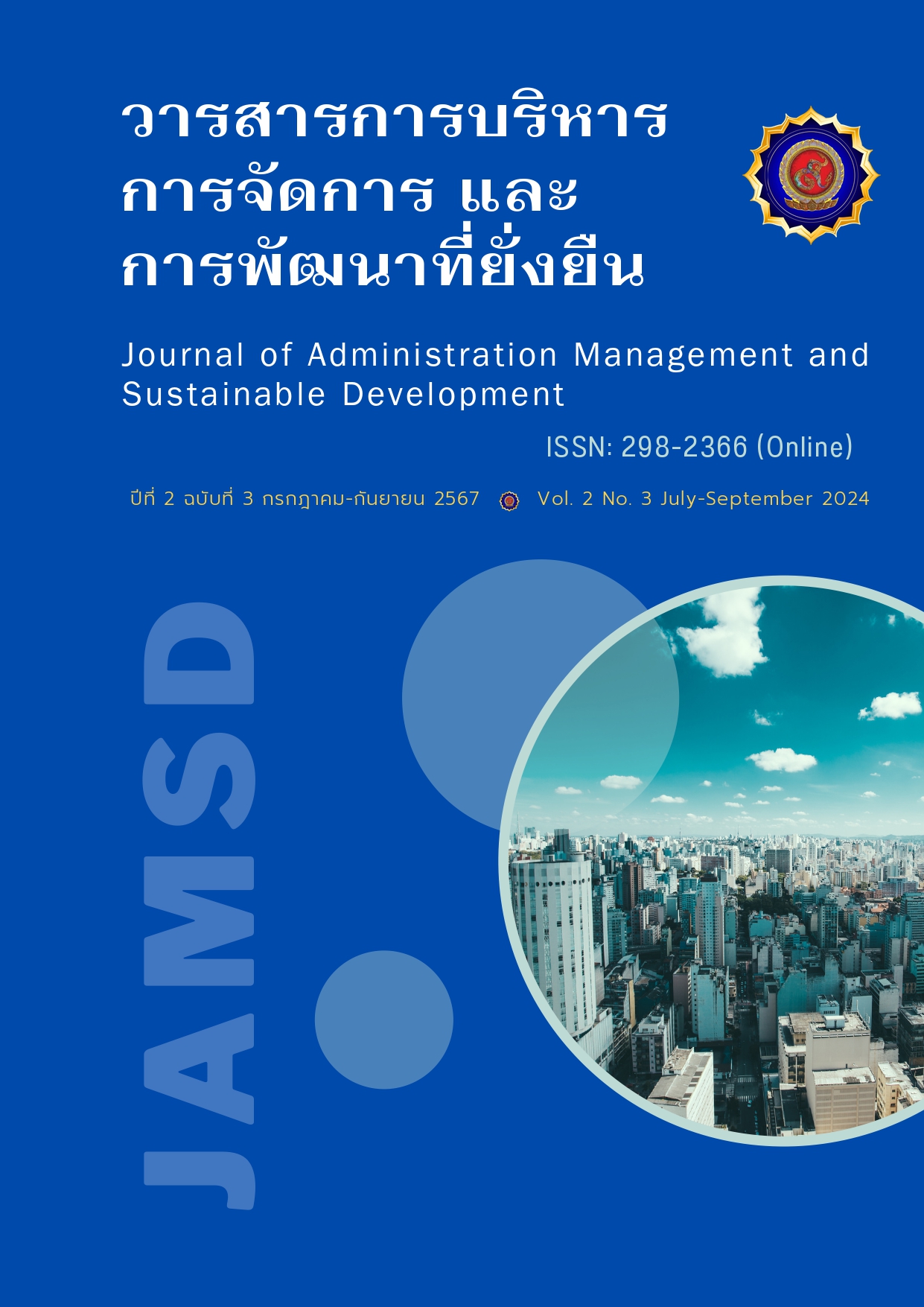Academic leadership of educational institution administrators medium sized schools under Udon Thani municipality
Abstract
This research aimed to study the level of academic leadership of school administrators in medium-sized schools under Udon Thani Municipality and the development guidelines for academic leadership. The sample consisted of 5 school administrators and 97 teachers, totaling 102 people. The key informants for the interviews were 1 director of the Office of Education and 2 school directors, totaling 3 people. The research instruments consisted of a 5-level rating scale questionnaire with 47 items and an IOC between 0.67 and 1.00, as well as an interview form. The statistics used for data analysis were frequency, percentage, mean, standard deviation, and content analysis. The research findings revealed that 1) The academic leadership of school administrators in medium-sized schools under Udon Thani Municipality was at a high level. The overall academic leadership of school administrators in medium-sized schools under Udon Thani Municipality was at a high level. 2) The development guidelines for academic leadership of school administrators in medium-sized schools under Udon Thani Municipality found that 1) In terms of taking care of teachers and students closely, there should be classroom visits, promotion and development of students’ knowledge and abilities, and provision of substitute teachers. 2) In terms of coordinating the implementation of the curriculum Should have knowledge and understanding of curriculum management and promote teaching and learning activities of teachers, assign personnel to coordinate 3) In terms of curriculum implementation and being a leader in curriculum creation or development 4) In terms of school goal determination, there should be an assessment of the needs of teachers, personnel, and related persons to determine and develop the academic goals of the school. 5) In terms of promoting teacher professional development, teachers should be supported to receive academic training, promote and support teachers to apply the skills gained from training to organize learning activities, and pass them on to teachers in the school. 6) In terms of communicating school goals, there should be a meeting to explain the academic goals of the school to teachers, students, parents, and related persons, and publicize them through various, modern, and fast media. 7) In terms of controlling teaching time, classrooms should be visited, classrooms should be supervised, and substitute teaching should be provided. 8) In terms of providing learning support, learning atmosphere should be promoted, students should be praised for outstanding academic achievements, and students should be encouraged to participate in academic skill competitions. 9) In terms of checking student progress, test results should be used to evaluate progress towards goals. 10) In terms of school academics, students’ achievements should be used to set school goals, and test results should be promptly notified to students and parents. 11) In terms of developing and creating academic standards Academic criteria should be announced to students, teachers, parents, and related persons. Standard criteria should be set for 12) student learning, and there should be an order to appoint an academic working group. 13) Teacher teaching supervision and evaluation should be issued. There should be an evaluation of teaching management to develop learners to have quality according to the curriculum objectives, and feedback should be given to teachers on teaching leadership every time there is teaching supervision. 14) In terms of providing incentives for teachers, teachers should be honored and encouraged to use their abilities and skills to their full potential.
References
ซัมซียะห์ เมาลิดิน. (2564). ภาวะผู้นำทางวิชาการของผู้บริหารสถานศึกษา ตามความคิดเห็นของครู สังกัดสำนักงานเขตพื้นที่การศึกษาประถมศึกษานราธิวาส เขต 1. สารนิพนธ์ ศึกษาศาสตรมหาบัณฑิต สาขาวิชาการบริหารการศึกษา: มหาวิทยาลัยหาดใหญ่
ณัฐชานันท์ โตนาม. (2562). ภาวะผู้นำทางวิชาการของผู้บริหารสถานศึกษา กลุ่มเครือข่าย อำเภอบางบัวทอง สังกัดสำนักงานเขตพื้นที่การศึกษาประถมศึกษานนทบุรี เขต 2. วิทยานิพนธ์ ศึกษาศาสตรมหาบัณฑิต สาขาการบริการการศึกษา คณะครุศาสตร์อุตสาหกรรม: มหาวิทยาลัยเทคโนโลยีราชมงคลธัญบุรี.
ธนิต รัตนศักดิ์. (2565). ภาวะผู้นำทางวิชาการของผู้บริหารสถานศึกษา สังกัดสำนักงานเขตพื้นที่การศึกษาประถมศึกษาปราจีนบุรี เขต 2. วิทยานิพนธ์ ศึกษาศาสตรมหาบัณฑิต สาขาวิชาการบริหารการศึกษา คณะศิลปศาสตร์: มหาวิทยาลัยเกริก
บาลกีส กาซา. (2560). ภาวะผู้นำทางวิชาการของผู้บริหารสถานศึกษาในอำเภอกรงปินัง สังกัดสำนักงานเขตพื้นที่การศึกษาประถมศึกษายะลา เขต 1. การค้นคว้าอิสระ สาขาวิชาการบริหารการศึกษา มหาวิทยาลัยราชภัฏยะลา
บุญชม ศรีสะอาด. (2554). หลักการวิจัยเบื้องต้น. (พิมพ์ครั้งที่ 9). กรุงเทพฯ: สุวีริยาสาส์น.
บุญพา พรหมณะ. (2559). ภาวะผู้นำทางวิชาการของผู้บริหารสถานศึกษา สังกัดสำนักงานเขตพื้นที่การศึกษาประถมศึกษาสุราษฎร์ธานี เขต 1. วิทยานิพนธ์ครุศาสตรมหาบัณฑิต มหาวิทยาลัยราชภัฏนครศรีธรรมราช.
มะไซดี อับดุลกอเดร์. (2565). ภาวะผู้นำทางวิชาการของผู้บริหารสถานศึกษา สังกัดสำนักงานเขตพื้นที่การศึกษามัธยมศึกษานราธิวาส. การค้นคว้าอิสระ ครุศาสตรมหาบัณฑิต สาขาวิชาการบริหารการศึกษา มหาวิทยาลัยราชภัฏยะลา
วิเชียร วรรณภากร. (2560). การศึกษาภาวะผู้นำทางวิชาการของผู้บริหารสถานศึกษามัธยมศึกษาในเขตอำเภอเมือง จังหวัดตราด สังกัดสานักงานเขตพื้นที่การศึกษามัธยมศึกษา เขต 17. วิทยานิพนธ์ สาขาวิชาการบริหารการศึกษา คณะศึกษาศาสตร์ มหาวิทยาลัยบูรพา
สถาบันพัฒนาความก้าวหน้า. (2553). ยุทธศาสตร์การพัฒนาวิชาชีพผู้บริหารสถานศึกษา ตามหลักเกณฑ์ใหม่. กรุงเทพฯ: เอส.พี.เอ็น. การพิมพ์
สำนักงานคณะกรรมการพัฒนาระบบราชการ. (2553). ชุดเครื่องมือการเรียนรู้ เรื่องการบริหารการเปลี่ยนแปลง. กลุ่มพัฒนาระบบบริหาร สำนักงานคณะกรรมการพัฒนาระบบราชการ.
เสาวภาพันธ์ ศรีประเสริฐ. (2560). ภาวะผู้นำทางวิชาการของผู้บริหารสถานศึกษาในโรงเรียนขยายโอกาสทางการศึกษา สังกัดสำนักการศึกษาเมืองพัทยา. วิทยานิพนธ์ สาขาวิชาการบริหารการศึกษา คณะศึกษาศาสตร์ มหาวิทยาลัยบูรพา
Chell, J. (2001). Introducing Principals to the Role of Instructional Leadership. SSTA Research Centre Report. 27(3), 1-10.
Hallinger, J. S., Murphy, S.L. (1985). Work stress and social support. Reading. Massachusetts: Addison-Wesley Publishing Company.
Murphy, K. J. and Kevin, O. (1999). Handbook of Labor Economics. Amsterdam: North-Holland Constructivist Perspective.






